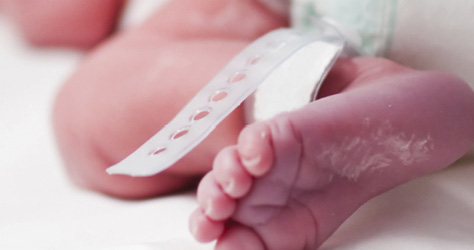Premature babies - A precious early arrival
Some little ones like to hang around past their due date, while others can’t wait to meet you. And if they decide to make an entrance before they are 37 weeks, they will be considered premature.
Around 7% of babies arrive early, and your baby's subsequent care will largely depend on how premature they are.
At a glance
- Around 7% of babies arrive prematurely
- NICU & SCBU are specialist wards which look after the smallest babies after their birth
- Ask lots of questions & get involved in your baby's care

What are the causes of premature babies?
It’s not always possible to explain why a baby has arrived early, but there are some factors that make it more likely:
Smoking and drug use – smoking through pregnancy can affect your baby’s development in a number of ways and increases your chances of having a premature baby
Pregnancy Problems – Certain pregnancy problems can cause premature labour including bacterial infections, an abnormality of the uterus and cervical weakness.
What will happen if you go into premature labour
The signs of a premature baby arriving are the same signs of labour you’d expect when full term. You’ll begin to have contractions, your waters will break and you may experience a “show” where the plug of mucus that has sealed your cervix comes away.
If it looks like your baby is going to arrive early, you might be given drugs to temporarily stop your contractions and steroid injections to help lessen your baby's chances of having breathing difficulties or bleeding.
You might also be transferred to a hospital that has special units for the care of premature babies.
When you arrive at hospital, your doctor or midwife will give you a check-up and work out if your cervix is shortening and opening ready to go into labour.
In some cases, the signs of labour will be a false alarm and your pregnancy will continue for a while longer.
Care available for premature babies
The care a premature baby receives will vary on how early they are. Recent advances in neonatal care mean that some babies will survive even when born as early as 22 weeks. A very premature baby will be at risk of hypothermia, low blood sugar level, low blood pressure, infection and help with their breathing.
Neonatal Intensive Care Units (NICU), or Special Care Baby Units (SCBU) are the specialist wards which look after the smallest babies after their birth. The teams working in NICU and SCBU will give your baby special care to help them with their breathing, feeding and temperature regulation.
As emotional as it is for a mum or dad to see their baby in NICU or SCBU, the care given in these units mean even little ones delivered as early as 26 weeks have a very good chance of survival and normal development.
How you can care for your premature baby
If your baby is early, you will no doubt have concerns and worries. Don't be afraid to ask lots of questions, or be involved in your baby's care, even if this is just by talking to your baby and stroking them through their incubator.
Your doctors might suggest 'kangaroo care' if your baby is big enough, where you have them against your chest with skin to skin contact. This will not only soothe your baby, but give you precious bonding time, too.
You will also be encouraged to express milk to feed your baby with if they are not strong enough to feed from you – your breast milk can then be given to your baby via a feeding tube.
You and your partner will need a lot of help and support if your baby is premature. The premature baby charity Bliss can help you with this.